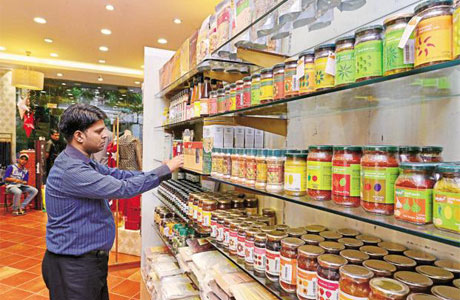A proliferation of products derived from natural sources is driving rapid growth in the organic market
Parvati Phadnis, 31, an advertising professional who lives in the Mumbai suburb of Andheri, shifted to consuming organic fruits, vegetables and staples a year ago after her pregnancy. Over the year, she has also started using cold-pressed organic coconut oil for her baby’s massage and applying organic cosmetics.
“Traditional food is full of pesticides, harmful hormones and toxins, which take away from their nutritional value,” Phadnis says, explaining the shift.
For Kiran Martis, 58, too, the shift to an organic lifestyle started 15 years ago when she felt the need for more nutritional and cleaner food. She didn’t stop there. Martis now uses a whole range of organic products, including detergents and floor cleaners that don’t harm the environment.
“It is about living a holistic and wholesome life,” she says.
Consumers like Phadnis and Martis are moving from experimenting with to embracing an entire lifestyle centred on organic brands, a switch made easier by the proliferation of products derived from natural sources in recent years. That’s driving rapid growth in the organic market.
“In the last few years, the change we are seeing is that people are buying the entire month’s groceries from the organic section instead of just one or two items. This will only grow further in the coming years,” says Subratta Dutta, chief executive officer, Fabindia Overseas Pvt. Ltd, which started its organic foods section 10 years ago.
An organic lifestyle is no longer just a fad. Higher disposable incomes and greater awareness mean middle-class consumers are willing to spend more on products they believe are good for health and the environment. Doctors and nutritionists are doing their bit, advising consumers to switch to organic products in cases varying from allergies to diabetes.
“All of it is coming together now—an increased availability of products and in general a growing awareness of organic,” says Mohit Khattar, managing director, Godrej Nature’s Basket, the premium gourmet store chain from Godrej Group.
The organic category at Godrej Nature’s Basket has been growing at an annual pace of 40% for the past two years. According to Khattar, the growth rate would have been higher but for the lack of a consistent supply and brand presence across all categories.
“In categories like dairy, poultry, fruits and vegetables, supply remains a constraint with no national brands. In categories like rice and pulses, where we have national brands, organic already accounts for a third of the overall category’s sales,” says Khattar.
By definition, an organic product contains no chemicals, fertilizers or pesticides. In the case of fruits, vegetables and staples, the soil used to grow the produce is also organic. Likewise for processed food or personal care products; to be certified as organic by a body like Ecocert Groupe, at least 95% of the ingredients in a product need to be organic.
The certification process focuses on the inputs being free of pesticides and chemicals. Land conversion to organic can take three-four years—that’s how long it takes to get the toxic elements out of the soil. Farmers need to be trained for growing organic crops.
Storage costs for organic food are higher because the products are free of chemicals or pesticides. So, they end up costing around 20-30% more than conventional food products.
“The high costs is a major challenge in India where consumers are very price-sensitive, limiting the acceptance of organic food to cities like Mumbai, Delhi, Chennai, Bengaluru, Gurgaon and Pune,” says Siddharth Bafna, partner and head of corporate finance, Lodha & Co.
For those making the shift to organic, the cost doesn’t matter, says Kavita Mukhi, eco-nutritionist and founder of the natural and organic food company Conscious Foods, which she exited in 2001.
Mukhi now organizes the Farmers’ Market in Mumbai and feels that the shift to organic has nothing to do with affluence. “There are people who put their last penny into buying organic as they are conscious of the environment and what the benefits are to them,” she says. They may go without fancy clothes, but will make sure they only consume organic products, she adds.
Shweta Dewoolkar, 35, a homemaker who lives in the Mumbai suburb of Borivali with her husband, mother-in-law and five year-old daughter, corroborates Mukhi.
“We shifted to eating organic four months ago and our grocery bills have since doubled. However, we no longer eat out, making this shift affordable,” says Dewoolkar.
Globally, the organic food market is estimated to be worth $80-85 billion and growing at 15-16%. It is a small fraction of the overall food market, which is close to $4 trillion, says Pankaj Gupta, who heads the consumer and retail practice at Tata Strategic Management Group, a management consulting firm.
There are no precise estimates on the overall value of the Indian organic food market. All the same, organic product manufacturers are growing exponentially.
For instance, Sresta Natural Bio Products Pvt. Ltd, which sells organic products ranging from staples to honey and jam, expects to double sales year-on-year for the next five years.
According to N. Balasubramanian, chief executive officer at Sresta, the organic staples market is estimated to be worthRs.350 crore a year and the company has a near 30% share.
Smaller start-ups like Terra Firma Projects Pvt. Ltd, maker of organic food products branded Terra Greens Organic, and Syscom Consumer Products (P) Ltd, which makes personal care products branded Organic Harvest, both of which were launched in 2013, are growing at an even faster rate.
“We did not have that much acceptance when we started. But every two-three months, that is changing with the kind of growth we are seeing. We have already grown 300% over last year to date,” said Likitha Bhanu, executive director, Terra Firma Projects, whose range of products includes pulses, flour, pickles and honey.
Likewise for Syscom Consumer. The company expects to end financial year 2016 with a revenue of Rs.35 crore—a 250% annual increase.
“We are getting good response for our products from tier-II cities as well. There is huge preference for organic as people are realizing that mineral oil and paraffin found in cosmetics can cause cancer,” says Sumesh Sood, chief executive officer, Syscom Consumer.
The smaller companies are also being helped by the growing popularity of e-commerce. For Terra Firma, online sales account for close to 15% of its overall sales.
Gaurav Sharma, 28, who had a 60-year-old family business in traditional spices, decided to launch organictokri.com in 2013 to promote organic spices from the north-east.
The rapid pace of growth is attracting investors. In March 2015, Rajasthan-based organic food company Nature Land Organic Foods Pvt. Ltd raised an undisclosed amount of funding from SIDBI Venture Capital Ltd’s Samridhi Fund.
In March 2013, Fabindia acquired a 40% stake in Organic India for Rs.15 crore. The company is now looking at forging alliances with organic manufacturers to provide a larger range of products to its consumers. This will see Fabindia’s organic section double its revenue every 18-24 months as it outpaces the overall organic market, which is growing at 20-22%, says Dutta.
“We are seeing a lot of investor interest,” said Sood of Syscom Consumer, who is in talks with three venture capital firms for raising money. Bhanu of Terra Firma said he has been approached by venture capitalists with funding offers.
Yet, there is a long way to go. It is only now that food regulator Food Safety and Standards Authority of India has decided to set standards for organic products in the domestic market. So far, it has been up to the company to get certified by accredited bodies.
An official at the Agricultural and Processed Food Products Export Development Authority said once the standards are in place, they would help tackle companies passing off their products as organic when they are not.
“Currently, as there are no regulations, there is no way to deal with them,” the official said on condition of anonymity.
Organic brands bloom as shoppers embrace chemical-free lifestyle















Add Comment